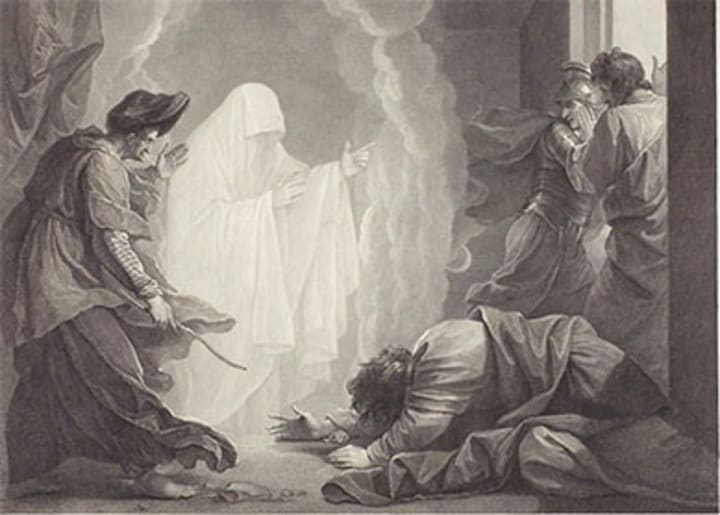
In ancient mythology and folklore, witches figure prominently. This includes the Biblical Witch of Endor and Russian folklore's Baba Yaga. They are renowned for their magic and sleight of hand and are sometimes employed for good, and occasionally to cause mischief for the sake of mischief.
The Witch of Endor

It is believed that the Christian Bible has an exclusion against divination, witchcraft, and divination, which can likely be attributed to the Witch of Endor. The Witch of Endor In the chapter of Samuel, King Saul of Israel had a few issues when he sought help from the witch and asked her to forecast the future.
Saul, along with his children, was about to fight their foes, the Philistines, and Saul thought it was the right time to seek insight from the supernatural regarding what was likely to transpire the following day. Saul began by asking God for assistance. However, God did not respond and remained mum... and that's why Saul decided to look for answers elsewhere.
As per the Bible, Saul summoned the witch of Endor, and she was known as a popular medium in the region. He disguised himself to make sure she didn't be aware that she was in the presence of the King. Saul requested that the witch revive the prophet Samuel to inform Saul of what was to transpire.
What was it that made up the Witch of Endor? As with other biblical characters, there is no information available. While her identity is lost to legend and myth, she can be mentioned in contemporary writing. Geoffrey Chaucer makes reference to her in The Canterbury Tales, in the tale that is told by the friar to amuse the pilgrims around him. The friar informs his listeners:
"Yet please tell me, he told the summoner, if it's true that you create your bodies every time? What is the matter with these elements? The fiend responded, No, sometimes it's just some kind of disguise."
"We have dead bodies that we can visit that are arising to discuss all the motives and also concerning the Endor Witch", quoting the friar to her listners.
Circe

One of the most well-known mythological lovers of mayhem is Circe, who is featured in The Odyssey. According to the legend, Odysseus and his Achaeans were forced to flee the country belonging to the Laestrygonians. After an enclave of Odysseus, scouts were rounded up and consumed by the Laestrygonian King, and almost all his vessels were sunk by massive stones. The Achaeans ended up at the shores of Aeaea, which was home to the goddess of the witch, Circe.
Circe was well-known for her magical muse and for her knowledge of the plants she cultivated and her potions. According to certain sources, she could be one of the daughters of Helios, the god of the sun, and also one of the Oceanids. However, she is often referred to as the daughter of Hecate, who was the goddess of magic.
Circe changed Odysseus's men into pigs, so he went out to save the pigs. When he arrived, he was greeted by the messenger god Hermes, who advised him on how to beat the attractive Circe. Odysseus took Hermes with his helpful suggestions and was able to defeat Circe, who transformed the men back into males... and later became Odysseus, his lover.
After about a year of sleeping in Circe's bed, Odysseus finally figured out that he needed to return home to Ithaca as well as to the wife of his, Penelope. The beautiful Circe was a woman who could or might not have given Odysseus two sons and provided him with instructions that led him across the globe as well as on a secondary journey to the Underworld.
Following Odysseus's passing away, Circe used her magic potion to bring her lost lover back to life.
Bell Witch

Folklore and mythology have roots in distant, ancient places. However, certain of them are recent enough to be considered urban myths. The tale of the Bell Witch, for instance, was written in the 1890s in Tennessee.
According to the author, Pat Fitzhugh, of the Bell Witch website, there was "a terrifying entity that afflicted the family of a pioneer on the frontiers of Tennessee between 1817 and 1821." Fitzhugh describes how the settler, John Bell, and his family moved into Tennessee after a move from North Carolina in the early 1800s.
They then purchased an extensive homestead. There was a short time before bizarre things started to happen with the sightings of bizarre animals that had "the form of a dog" and "the head of a rabbit" in the fields.
For added drama, Then, the teenager Betsy Bell started to experience physical encounters with a ghost and claimed that it had hit her as well as pulled her hair. While he initially told Bell's family to keep the matter at a minimum, Bell finally confided in one of his neighbors, who organized an event that was led by none other than the local General, Andrew Jackson.
A third member of the group claimed to be a "witch tamer" and was carrying pistols and silver bullets. However, the entity wasn't satisfied with the silver bullet, or it was, in fact, the witch tamer, as the man was ejected from the residence. Jackson's crew begged Jackson to quit the property, and, even though Jackson insisted that he would stay to study further in the morning, the entire group was seen departing from the farm.
Troy Taylor of PrairieGhosts claims, "The spirit identified itself as the witch from Kate Batts, a neighbor of the Bells who, along with John, had had a bad experience in business dealings with regards to some bought slaves." "Kate," as the locals began to call the spirit, was known to make regular appearances at Bell's home. "Bell home, inflicting destruction on the residents. After John Bell died, though, Kate stuck around and was haunted by Betsy until she reached adulthood.
Medea

As we can see in the tale that follows Odysseus as well as Circe, Greek mythology is full of witches. At the time that Jason and his argonauts embarked on a search to locate the Golden Fleece, they decided to take the item from King Aeetes of Colchis.
What Aeetes did not realize was that his son Medea was attracted to Jason, and after being seduced by and later marrying him, the enchantress assisted her husband in taking his Golden Fleece from her father.
Medea was believed to descend from God and was the sister of Circe. With the ability to prophesy, Medea was able to warn Jason about the dangers in front of him on his journey. Once, once he had got the fleece, she left with Jason aboard the Argo and enjoyed a blissful life afterward... for approximately 10 years.
In the end, as is typical in Greek mythology, Jason found himself another woman and put Medea aside in favor of Glauce, who was the child of the Corinthian King, Creon. Never one to take rejection well, Medea sent Glauce a beautiful golden dress that was smothered with poison, leading to the death of the princess and her father, who was the King.
As retribution, the Corinthians executed the two children of Jason and Medea's kids. To demonstrate to Jason she was kind and furious, Medea killed two of the children by herself, leaving just her child, Thessalus, to survive. Medea ran away from Corinth with the golden chariot of her great-grandfather, Helios, the sun god.
Baba Yaga

In Russian folklore, Baba Yaga is an old witch who can be frightening or the protagonist of the story. Sometimes she even manages to do both.
The character is described as having teeth made of iron and a terrifyingly large nose. Baba lives in a hut near the edge of the forest that can move independently and is depicted with legs similar to chicken legs. Baba Yaga is not like other folklore witches who move around on broomsticks.
Instead, she rides in a massive mortar, which she pushes around with a similarly large pestle, rowing it at the speed of a boat. She sweeps away the tracks behind her using the broom that is made of silver birch.
In the end, nobody can be sure whether Baba Yaga can aid or hinder those seeking her assistance. Most often, people who are bad receive their fair share of the blame for their actions. However, it's not that she is trying to save the good, but that evil has its consequences and Baba Yaga is only there to watch these consequences being dealt out.





Comments
There are no comments for this story
Be the first to respond and start the conversation.